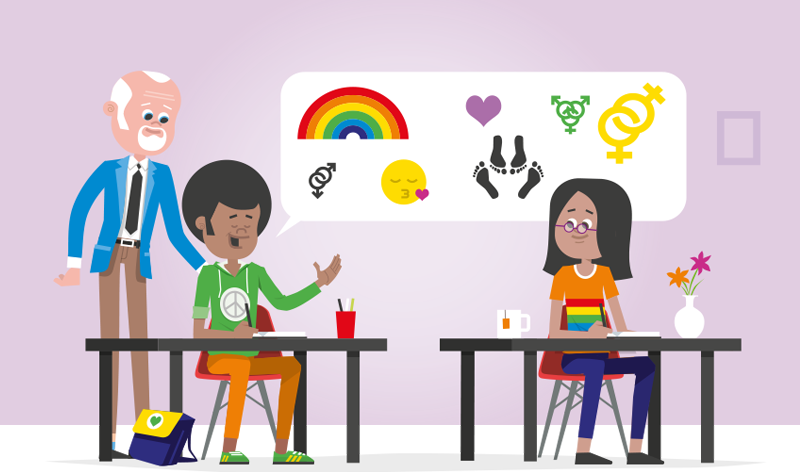12+ Idioms Examples for Kids
The language we speak can be very fascinating. There are instances when somebody can say something that may not sound right to you, yet makes complete sense to another individual. You could analyze the statement over and over again, yet remain absolutely clueless on what it really means. Chances are, you may have encountered an idiomatic expression.
Sometimes, people find it easier to express their thoughts and feelings by using idioms. This is because idioms make conveying a certain message a lot more enjoyable, whether this is relayed orally or through writing. It gives a statement more life, often exaggerating a thought like a hyperbole expression. But remember, these expressions must never be taken literally, as its general meaning may mean something entirely different.
What are Idioms?
Idioms are figurative expressions comprised of combined words that take on a different meaning from its literal definition. For instance, imagine if the line “when pigs fly” was taken literally. We’d probably have flying pigs filling earth’s atmosphere on a daily basis. There are thousands of idiomatic expressions in the English language, yet these idioms may be tailored by its native speakers as well. This is because these expressions come naturally to them, where they can often hear it from people at school, at home, or from the television.
Purpose of Idioms in Literature
Similar to how there are metaphors for writers, idioms have an interesting role in literature. From poems to short stories, idioms play a significant part in writing, with many writers using the expression to convey a given message humorously and creatively. Imagine how dull a literary piece would be if idioms were never a part of a language. Idiomatic expressions simply add color to your writing, making your work seem more impressive and intriguing than usual. However, the use of idioms also has its downside. For one, it isn’t a universal language that people from anywhere around the world can understand. Sometimes, the incorrect usage and interpretation of such can gain negative results. Knowing this, it’s important for both writers and readers to understand how these idioms should be used in a statement.
13 Fun Idiomatic Expressions for Kids
As a kid, you tend to understand words and phrases in its literal sense. But because idioms have become a significant part of our language, it’s important for you to be familiar with it. That being said, here are some popular idiomatic expressions that kids can learn from:
1. Give It a Shot
When something seems too risky to do but you still have faith that it all will work out in the end, then you should give it a shot.
Being a risk-taker means trying despite the uncertainty of what lies ahead. To a child, this is an idiom that gives them hope. It gives an individual that extra push to take the chance before it’s too late. Because in the end, it’s better to have tried and failed than to never have tried at all. Otherwise, you might just regret not grabbing the opportunity while you still could.
2. Speak Your Mind

To speak your mind is to say what you really feel. Do you really think bottling up all your thoughts and emotions will do you any good? If anything, the words left unspoken are those that will haunt you for the rest of your life. Sometimes, saying how you really feel about something will give you peace. This could be the icebreaker to an awkward situation or even the peace treaty to a heated feud. However, speaking your mind shouldn’t give you a reason to be tactless. Think before you speak, or you might just end up losing the person while trying to win the argument.
3. Mixed Feelings

There are instances when we get this bittersweet feeling over a particular situation. It’s as if we’re happy that it happened, but at the same time, we can’t help but feel sad that it had to end the way it did. It’s difficult to explain how we truly feel about something, especially when we’re unsure of our own emotions. Having mixed feelings is not a bad thing, but it does make it difficult for us to express ourselves in a way that people around us would understand. After all, it’s not like we could fully control how we feel.
4. Class Clown

A class clown is someone who has the ability to make everyone laugh with his or her unique sense of humor. Every class has a student with a witty personality, who’s constantly joking around and grabbing just about anyone’s attention. This is the type of person you’ll miss when they aren’t around, the one you’ll look for when all you need is a good laugh. A class clown is considered to be a blessing to all, especially when you want to escape the reality of grades and deadlines even if it’s just for a few seconds. So learn to cherish the class clown, despite how annoying they could be at times.
5. Out of the Blue
If a certain event happens out of the blue, then it means you weren’t expecting it. These events occur with no warning, often catching you by surprise. For instance, when an old friend you haven’t talked to in ages suddenly appears on your doorstep. The two of you drifted apart over the years, so seeing one another out of the blue has to be a pleasant surprise. This expression is one of the most commonly-used idioms out there, making it a widely-used expression for individuals of any age.
6. Change of Heart

They say that the heart and the mind can never reach a mutual agreement no matter how hard they try. But when it comes to this idiomatic expression, having a change of heart actually means you’ve changed your mind. There are moments when we are forced to make a decision right away, without having the time to think things through. When this happens, we’re often left regretting our initial choice. We start to take everything back, claiming that we had a change of heart. In most cases, having a change of heart can be a bad thing. It shows how quickly one’s mind can change and how this may greatly affect the entities involved in the near future.
7. Pig Out
The holiday season has to be everyone’s favorite alibi for pigging out. After all, wouldn’t it be an insult not to touch the mashed potatoes and apple pie your mom just prepared for the whole family?

For one thing, pigs have always been perceived as overweight farm animals. Their huge and heavy build has earned them that title, so it’s not hard to see why this idiom came to be. Eating more than the average person can consume per meal is something that we savor during family dinners and holiday get-togethers.
8. Let the Cat Out of the Bag

We’ve all been there. We let the cat out of the bag even when it wasn’t in our intention to do so. You see, keeping a secret can be quite difficult for some people. It’s not like they aren’t trustworthy individuals, as sometimes, these words tend to slip out accidentally. It’s an honest mistake that we’re all guilty of committing. The whole idea of revealing a secret so carelessly won’t fit well with everybody, so you can’t expect that mistake to slide so easily.
9. Eat My Hat
This is a common expression used by a speaker who is confident in the outcome of a given scenario. Who in their right mind would even eat a hat? When you exaggerate your conditions, it portrays how certain you are that something is unlikely to happen. This idiomatic expression can be used at any time, even if you don’t have a hat on top of your head at that particular moment.
10. Draw a Blank

The human body is amazing. We have a mind that can store and process so much information, yet there are times when it feels like there is nothing there. You could study hard for an exam, but still end up forgetting a few significant points while taking the test. When you draw a blank, it means you can’t remember something important. It may take some time before you finally remember, or it may never come back until you stop searching for it. Much like a blank paper, nothing but emptiness fills your head.
11. Cry Crocodile Tears
If you’ve heard about the girl who cried wolf, then you might be familiar with the one that cries crocodile tears, too. This expression of sorrow reflects insincerity. It’s like acting as if you’re sad, even if you aren’t. So you must be wondering, do crocodiles actually cry? Experts say that they do. But like this idiom, an emotional response isn’t the cause for such, as the manner in which these reptiles eat is what trigger the shed of tears.
12. Call It a Day
After countless hours of research, it’s finally time to call it a day. This is a common line used by students, employees, and just about anyone who has spent a good part of their day being productive. When you call it a day, it means to put a stop to what you are doing or that you have completed the tasks needed to be done for the day. So the next time a person says this idiomatic expression, drop everything and take a much deserved rest.
13. Read between the Lines
The expression “read between the lines” refers to discovering a given meaning that has been stated indirectly. To help you understand this idiom, let’s take this for example. Guys often complain about girls being hard to read. They may be saying one thing, but they actually mean the exact opposite. When this happens, your friends would tell you to read between the lines to find out what she really meant by it.
However, reading between the lines can also be quite tricky. This can cause a misunderstanding between two entities, where you could either be overthinking something or underestimating it. To avoid either of the situations, make sure you read between the lines carefully. If you must, ask someone to help you out. A second opinion can definitely help you straighten things out a lot better.
Although idioms can make our language seem more interesting and vibrant, be careful not to overuse them in your statements. Using too many idioms can confuse a reader or listener, causing them to misinterpret the main point of your message. So, start reading a book. Know more about various examples of idioms. Expand your vocabulary. The only way you can learn how to use these expressions is by exposing yourself to them. With the proper understanding of idioms, you’re sure to be using them as a pro in no time.


